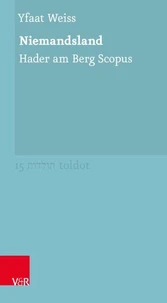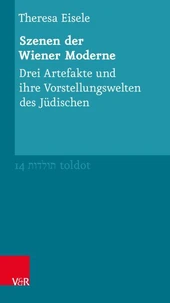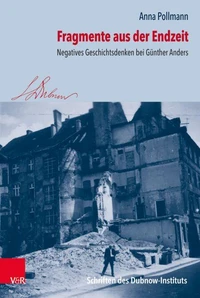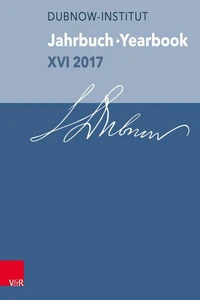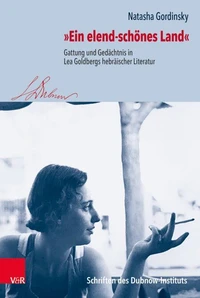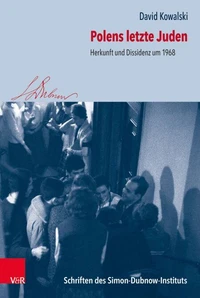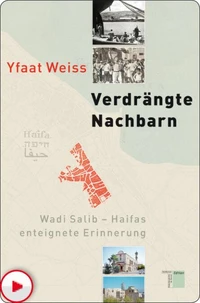Jahrbuch des Dubnow - Instituts /Dubnow Institute Yearbook XVII/2018
Par : , , , ,Formats :
Disponible dans votre compte client Decitre ou Furet du Nord dès validation de votre commande. Le format PDF est :
- Compatible avec une lecture sur My Vivlio (smartphone, tablette, ordinateur)
- Compatible avec une lecture sur liseuses Vivlio
- Pour les liseuses autres que Vivlio, vous devez utiliser le logiciel Adobe Digital Edition. Non compatible avec la lecture sur les liseuses Kindle, Remarkable et Sony
 , qui est-ce ?
, qui est-ce ?Notre partenaire de plateforme de lecture numérique où vous retrouverez l'ensemble de vos ebooks gratuitement
Pour en savoir plus sur nos ebooks, consultez notre aide en ligne ici
- Nombre de pages650
- FormatPDF
- ISBN978-3-647-37080-4
- EAN9783647370804
- Date de parution11/05/2020
- Protection num.pas de protection
- Taille11 Mo
- Infos supplémentairespdf
- ÉditeurVandenhoeck & Ruprecht
Résumé
The 2018 Yearbook of the Dubnow Institute comprises two focal points: The first offers new approaches to the history of the Jews in the GDR. Historical research has in recent decades focused primarily on the lives of Jewish Communists as well as the relationship between the SED to Jewish citizens of the GDR and to Israel. This volume therefore focuses on questions relating both to the lived realities in the Jewish communities of the GDR and to individual self-conceptions in the tension between Socialism and Jewish heritage in the "workers' and peasants' state".
The second focal point reports on the on-site cataloging work conducted in archives and private collections in Israel. Various aspects and perspectives of an only recently rediscovered tradition of German Jewish history are here presented on the basis of estates and collections identified, cataloged, and processed in the framework of a joint project of the German Literature Archive in Marbach and the Franz Rosenzweig Minerva Research Center at the Hebrew University in Jerusalem over the past years.
Archival theory and practice as well as questions of knowledge transfer and exile research are thereby addressed through case studies drawn from zoology, urban planning, orientalism, librarianship, film, and theater. The General Section and the Features of the Yearbook contain contributions on protagonists and facets of Jewish literary, political, philosophical, and economic history as well as their reception in Germany, Lithuania, the Soviet Union, and the United States, including Hannah Arendt, Lazar Gulkowitsch, Melvin J.
Lasky, and Georg Simmel.
The second focal point reports on the on-site cataloging work conducted in archives and private collections in Israel. Various aspects and perspectives of an only recently rediscovered tradition of German Jewish history are here presented on the basis of estates and collections identified, cataloged, and processed in the framework of a joint project of the German Literature Archive in Marbach and the Franz Rosenzweig Minerva Research Center at the Hebrew University in Jerusalem over the past years.
Archival theory and practice as well as questions of knowledge transfer and exile research are thereby addressed through case studies drawn from zoology, urban planning, orientalism, librarianship, film, and theater. The General Section and the Features of the Yearbook contain contributions on protagonists and facets of Jewish literary, political, philosophical, and economic history as well as their reception in Germany, Lithuania, the Soviet Union, and the United States, including Hannah Arendt, Lazar Gulkowitsch, Melvin J.
Lasky, and Georg Simmel.
The 2018 Yearbook of the Dubnow Institute comprises two focal points: The first offers new approaches to the history of the Jews in the GDR. Historical research has in recent decades focused primarily on the lives of Jewish Communists as well as the relationship between the SED to Jewish citizens of the GDR and to Israel. This volume therefore focuses on questions relating both to the lived realities in the Jewish communities of the GDR and to individual self-conceptions in the tension between Socialism and Jewish heritage in the "workers' and peasants' state".
The second focal point reports on the on-site cataloging work conducted in archives and private collections in Israel. Various aspects and perspectives of an only recently rediscovered tradition of German Jewish history are here presented on the basis of estates and collections identified, cataloged, and processed in the framework of a joint project of the German Literature Archive in Marbach and the Franz Rosenzweig Minerva Research Center at the Hebrew University in Jerusalem over the past years.
Archival theory and practice as well as questions of knowledge transfer and exile research are thereby addressed through case studies drawn from zoology, urban planning, orientalism, librarianship, film, and theater. The General Section and the Features of the Yearbook contain contributions on protagonists and facets of Jewish literary, political, philosophical, and economic history as well as their reception in Germany, Lithuania, the Soviet Union, and the United States, including Hannah Arendt, Lazar Gulkowitsch, Melvin J.
Lasky, and Georg Simmel.
The second focal point reports on the on-site cataloging work conducted in archives and private collections in Israel. Various aspects and perspectives of an only recently rediscovered tradition of German Jewish history are here presented on the basis of estates and collections identified, cataloged, and processed in the framework of a joint project of the German Literature Archive in Marbach and the Franz Rosenzweig Minerva Research Center at the Hebrew University in Jerusalem over the past years.
Archival theory and practice as well as questions of knowledge transfer and exile research are thereby addressed through case studies drawn from zoology, urban planning, orientalism, librarianship, film, and theater. The General Section and the Features of the Yearbook contain contributions on protagonists and facets of Jewish literary, political, philosophical, and economic history as well as their reception in Germany, Lithuania, the Soviet Union, and the United States, including Hannah Arendt, Lazar Gulkowitsch, Melvin J.
Lasky, and Georg Simmel.



